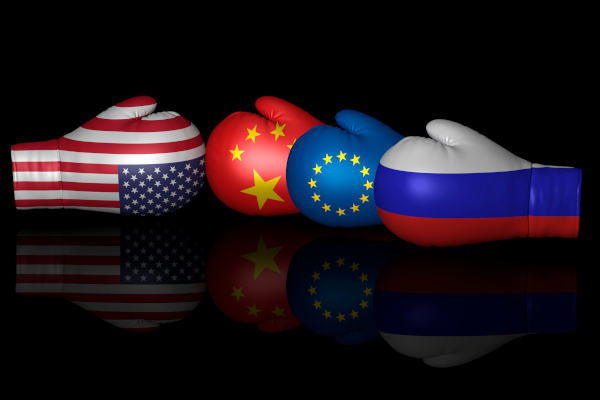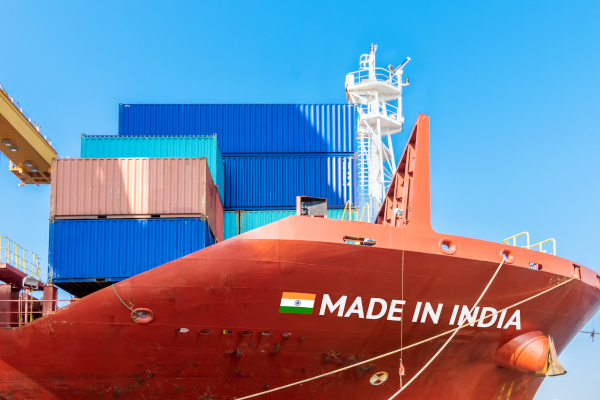Geopolitics, the Supply Chain, and Why It Matters
Speakers at recent ASCM conference explain why China, Russia and global affairs matter to individual businesses
Can supply chain leaders ignore geopolitical tensions around the world? The answer is likely no.
During the recent Association for Supply Chain Management Connect 2023 conference in Louisville, Kentucky, ASCM CEO Abe Eshkenazi sat down with Elliott Harris, former United Nations assistant secretary-general for economic development and chief economist, and John J. Sullivan, a distinguished fellow at the School of Foreign Service of Georgetown University and former U.S. Ambassador to Russia under both President’s Donald Trump and Joe Biden. The conversation took on many turns, including technology development, securing the food supply chain, and more, but one topic of particular interest is the role that geopolitics plays in the supply chain.
What follows is a snapshot of part of that discussion.
Topic: Is the education system capable of supporting technology advancements?
Harris: “We talk about a digital divide, and those who are on the wrong side of the digital divide will have no chance of catching up to those who are on the right side of the digital divide. I think that has to be a focus of policy domestically and globally. Even in this country, there are regions within this country where access to technology just isn’t as well guaranteed as it needs to be. And that sets a tremendous disadvantage to anybody trying to operate on that side of the digital divide. And I do think that that is a major challenge.”
“I think we had a multilateral or universal approach on trade as long as we were focused on trade in goods, raw materials, manufactured goods. But the global trading system has evolved tremendously. The supply chains have played a major role in that, and the majority of trade that happens between countries, between jurisdictions, now is in services, including supply chain services.”
Topic: With trade tensions, climate change and emerging technologies, where do we focus?
Sullivan: “What I focus on is where human beings interfere with that and what causes the trade tensions? Governments cause the tensions. Why are we concerned about the takeover of Taiwan by the People’s Republic of China for the United States? Sure, we have humanitarian interests in the people of Taiwan, but [it’s] the impacts on supply chains. If you think Vladimir Putin’s special military operation in Ukraine impacted its supply chains, imagine a war over Taiwan. So, when humans get involved, tensions develop and the intersection of technology and trade, whether it’s Russia trying to keep certain technologies from the Russian government for use in their war in Ukraine, or even I think with an even greater global impact as we’ve seen the United States trying to limit certain exports to China … That's the human element that creates the trade tensions and it's inevitable, but it's significant and it's not going away.”
Topic: As trade has evolved, can the global supply chain keep up?
Harris: “I think we had a multilateral or universal approach on trade as long as we were focused on trade in goods, raw materials, manufactured goods. But the global trading system has evolved tremendously. The supply chains have played a major role in that, and the majority of trade that happens between countries, between jurisdictions, now is in services, including supply chain services. Whereas we were trying to come together and incorporate around the regulations pertaining to the trading system in the context of the WTO, that is not where we are [now] trying to legislate the rules of the game for supply chains or for the trade and services. Those are happening in regional trade arrangements. Those are easier to manage. These are countries of like interest and it's much easier to come to agreement on what has to be done.
“The problem with that is that it’s a fragmentation, and this fragmentation is making the management, if you will, of supply chains and of global trade a somewhat more complicated matter. And it is opening it up much more to the kinds of tensions that John was talking about. And the problem here is that those who are making the decisions from the geopolitical perspective are looking at desired final results and may not be fully aware of all of the consequences of decisions that they take at the different stages of the supply chain on the way towards the final result. And I think that is the big tension that has to be managed.”
Topic: Food security is a national security concern for some countries. And now electric battery vehicles may be next. How do we balance these concerns?
Harris: “Well, I do think that the food price crisis and the food availability crisis has made quite clear that there are some things that are just not open for negotiation and that the global community has to try to secure the availability of food because it’s so fundamental. Now we are rapidly approaching a stage where, for example, the electric vehicle batteries are becoming as important to advanced economies as oil is. And those are considerations that change the way policy has to be defined. We have to be able to secure access to these critical commodities if you want to call them that. And to secure those, we need to have agreement with all parties that are concerned. And, I think, the greatest weakness is that there are disruptions that can happen to the global supply, be it of electric vehicle batteries or of food that occur in relatively small, relatively distant areas.
“And a small perturbation here is enough to disrupt the supply chain globally. And there is nothing that domestic policy can really do to prevent that from happening except to create an overall environment where everybody sees their own interest in preserving the sanctity of the supply chain. Now, when something happens like a geopolitical crisis or a war or a conflict or even a natural disaster of some magnitude, there is very little that can be done to avert that. And the challenge then is to try to find the kinds of policy interventions that have, first an immediate impact domestically, but then they also encourage the kind of impact you want to see in all other parts of your supply chain so that you can avoid these kinds of disruptions.”
Topic: Is an economic war with China inevitable?
Harris: “I fear it is perhaps not inevitable, but increasingly likely. I think one of the things that we see happening now is competition around technological supremacy. And I do think that's one of the issues that perhaps is a consideration for President Xi as well. I think the Chinese economy would have an awful lot more to lose from a conflict with Taiwan then Russia had to lose from a conflict with Ukraine. What does Russia sell globally? Raw materials primarily and the kind of raw materials that we tend to need all the time, oil and gas. But China’s economy is so much more dependent on trade in increasingly sophisticated, technologically sophisticated products that disrupting those relationships would be a real disturbance. Now whether it’s inevitable or not, I like to think back a little bit to the fifties and sixties after the Second World War when he had the emergence of Germany and Japan as major powerhouses, major sources of export, major sources of technological innovation as well. But with one fundamental difference, they did not aspire to be global superpowers. China does, and China is building its claim of global superpowerdom if that's a thing, on the ability to trade in increasingly sophisticated goods and now services. So that I think is a part of the consideration that might help to avert a conflict because what is at stake is so much more complex than simply selling oil and gas.”
Article Topics
ASCM News & Resources
Supply Chain Stability Index sees ‘Tremendous Improvement’ in 2023 Supply Chain Stability Index: “Tremendous Improvement” in 2023 The Right Approach for Supply Chain Education The reBound Podcast: Innovation in the 3PL supply chain Supply Chain’s Top Trends for 2024 Require Talent Investment for Success Resilience Certificate Now Available from ASCM ASCM conference highlights importance of geopolitics in the supply chain More ASCMLatest in Supply Chain
A Look at Baltimore’s Key Bridge Collapse—One Month Later European Parliament Passes New Law Requiring Supply Chain Accountability Baltimore Continues Bridge Recovery With Opening of New Channel How Shippers Can Prep for Hurricane Season Apple Accused of Multiple Human Rights Violations South Korea Finally Overtakes China in Goods Exported to U.S. UPS Struggles in First Quarter With Steep Earnings Decline More Supply ChainAbout the Author















